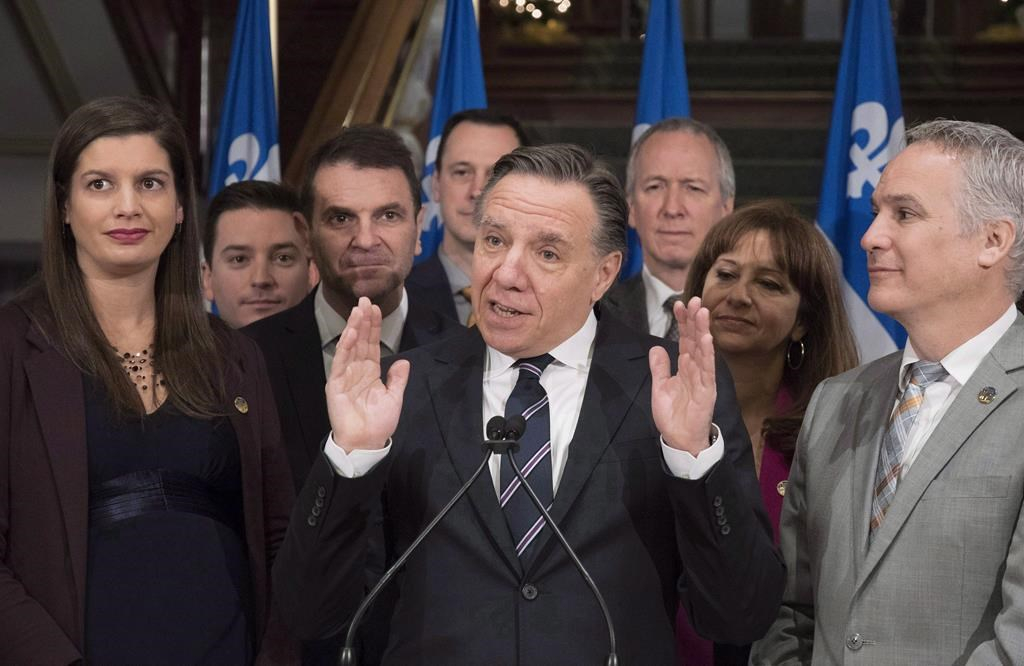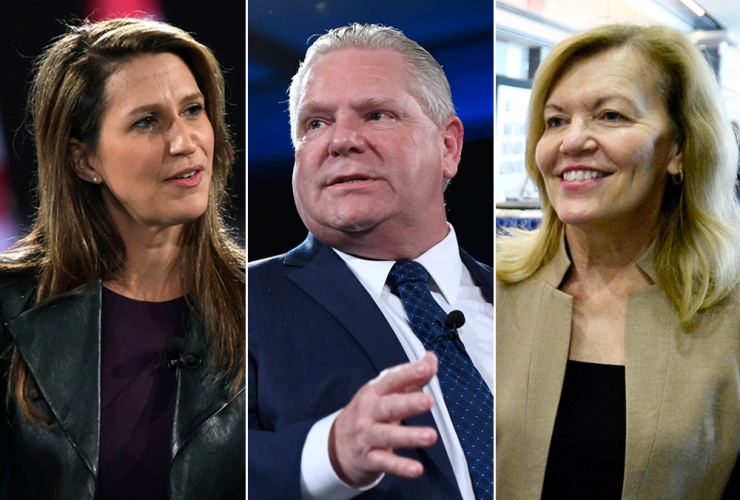A mere seven months remain before the next Quebec provincial election and with the Coalition Avenir du Québec (CAQ) enjoying a comfortable lead in the latest polls it was almost inevitable that the party would start facing intense scrutiny from its political adversaries. The CAQ’s questionable declarations regarding their yet-to-be-defined immigration “values test” — which would require recently arrived immigrants to be expelled from the province if they fail to integrate into Quebec society culturally and linguistically within a three-year period — drew accusations of identity politics from the other parties.
Proving that politics always make for strange bedfellows and that parties are always ready to defend ideals they once rejected if it suits their campaign agenda, the Parti Québécois and the Liberals recently joined forces to gang up on the CAQ to publicly criticize and undermine the current frontrunner.
The gloves first came off about two weeks ago, when, during an interview with the Montreal Gazette, Quebec Finance Minister and Liberal MNA Carlos Leitão described the CAQ as a party that’s promoting an “ethnic-based nationalism.”
“Pay attention to what the CAQ is saying; pay attention to the words they use in the National Assembly, because they have a very inward-looking approach,” Leitão told the reporter.
CAQ Leader François Legault immediately demanded an apology and accused Quebec Premier Phillippe Couillard of being guilty of “playing dirty politics,” deliberately trying to make him appear “anti-immigrant” and “racist.” A few days later, Nathalie Roy, the MNA for Montarville and the Coalition Avenir Québec spokesperson for immigration, penned an op-ed for the same paper, where she accused the Liberals of “being in panic mode.”
“To immigrate to Quebec is to want to integrate into our community, our values, our culture — and to learn our language,” she wrote.
The reason for a knowledge test for values, according to Roy, is to “ensure that every candidate for immigration knows and integrates values in line with the Quebec Charter of Human Rights and Freedoms before receiving the Quebec selection certificate.”
During Question Period at Quebec’s National Assembly last week, PQ leader Jean-Francois Lisée immediately waded into the CAQ’s “values test” debate, in essence providing the opportunity for Premier Couillard to call it “retrograde for Quebec and anti-economic.”
An unclear and unenforceable test
What will be on this infamous test? No one knows. How will we be assessing whether immigrants have passed successfully? Not a clue. Not only has Legault waffled on the level of French competency the “values test” would require, he also recently told reporters that “an immigrant can easily memorize the five, ten, 15 values by heart, even if he doesn’t believe in them.” Than what in the world is the test for?
Isn’t this just redundant demagoguery aimed at appealing to staunch nativists who think we are being invaded by the “wrong kind” of immigrants, in an immigration process Quebecers ultimately have no control over?
Incidentally, immigrants already sign a piece of paper agreeing to respect and value their new home. It’s called the Déclaration sur les valeurs communes de la société québécoise and it’s pretty basic as a document. It reiterates most of what we already know to be important and as Quebecers we aim to adhere to – equality between men and women, secularism, French as the primary public language, democratic rights for all, etc. This declaration on the common values of Québec society must be signed by anyone applying to select Quebec as their immigration destination. Implementing a new “values test” serves what purpose exactly? The obvious one – vote pandering.
In introducing a “values test” as part of his immigration policy, the CAQ’s Francois Legault is following the time-honoured tradition that many politicians before him have embarked on – including the two parties currently chastising him. It's a tradition of "brave" political opportunism, taking a hard stance on an imaginary problem for the sole purpose of winning an election.
Why else would you want to introduce a test about a set of values that immigrants are informed of the minute they land here, and threaten to expel those who “fail” said test, when, as a provincial government you don’t even have the legal power to go through with that threat? Why else, if not for the sole reason of appearing to be tough on immigration for the benefit of homegrown xenophobes? The existence of an already established set of values makes the attempt redundant at best.
While perhaps not outright ethnic nationalism, there is something deeply disconcerting about a politician who has in the past referred to the burqa as a “symbol of radical Islam” and who is against teachers and public servants wearing religious symbols, talking about “our” culture, “our” values and “our” community. What about people, like veiled Muslim women who like to don a burkini to hit the beach with their families, a turbaned Sikh man who wants to become a teacher, or a doctor who dons a hijab, who don’t fit into her (and her party’s) definitions of what “our” Quebec should look like?
Secular freedom is about ensuring that religious groups don’t interfere with affairs of the state and the state doesn’t interfere in religious affairs. It’s not about banning visible symbols of religion from the public. This incessant need Quebec politicians have to want to implement state-sanctioned discrimination and call it secularism continues to run the risk of marginalizing religious communities and treating innocent people like scary outsiders.
It doesn’t help matters much that on his Facebook page Legault expresses pride in “the kind of society our ancestors left me,” only reinforcing notions of “nous,” which treats every allophone, anglophone and recently arrived immigrant as “the others.”
Identity politics abound in all parties
And while the PQ and the Liberals might currently be in the business of pointing accusatory fingers, neither have been exempt from the exact same tactics of identity politics and fear-mongering that the CAQ is now employing. The PQ was behind the ill-fated Charter of Values, PQ leader Jean-Francois Lisée has gone on record in the past as saying that “we need to have a debate on the burkini” and has also employed terms like the “right kind of immigration” when looking towards Europe. It also wasn’t that long ago that the Quebec Liberal Party was rambling on about having newcomers sign a "moral commitment" to the province's core values and it recently introduced Bill 62, anti-niqab legislation that requires Muslim women who wear a burka or niqab to uncover their faces to ride a city bus. While the bill has been criticized for unfairly targeting Muslim women, both the PQ and the CAQ claim it doesn’t go far enough.
La Presse journalist Hugo Pilon Larose wrote a great explanatory piece recently, essentially debunking Legault’s test as a lot of hot air since it’s basically unenforceable. With the help of legal experts who specialize in immigration, he explains that the entire immigration process would have to change, and the federal government would have to agree to that for the CAQ’s plan to work. “If Ottawa were to say ‘no’, it would end there,” Jean-Sébastien Boudreault, president of the Quebec Immigration Lawyers’ Association is quoted as saying.
“Imagine that you decide to immigrate to Quebec. You leave your country, your family, and after three years, it’s possible that they tell you, ‘In the end you only received a 15 or a 16 on your values test, you have to leave.’ […] It makes no sense. It’s ultra-theoretical and I can’t see how you can apply something like that.”
France Houle, Dean of the Law Department at the Université de Montréal, and an immigration law specialist, also agrees with Boudreault’s conclusion. “The federal government is responsible for expelling immigrants, and it would have to somehow integrate within federal law that an immigrant who hasn’t properly mastered the French language would be forced to leave Quebec,” she says in the La Presse article. “The federal government would never do that since Canada is a bilingual country.” Houle goes on to clarify that once an immigrant has arrived here, it’s the Canadian government that decides who stays and for how long.”
Quebecers inclined to comment that we should, therefore, have more control over our immigration process should know that, over the years, Quebec has signed a number of immigration agreements with the federal government that have enhanced Québec’s ability to select and integrate immigrants and to ensure its development as a nation within North America. From the Canadian Encyclopedia: “While the federal government remains solely responsible for admitting immigrants into Canada and for determining the total number of immigrants admitted annually, Quebec, for its part, has secured sole responsibility in three areas related to permanent immigration: 1) the desired number of immigrants; 2) the selection of candidates who wish to settle in Québec (except for applicants for refugee status and members of the Family Class). Because the federal government still has the ultimate authority to determine conditions for admission of families and refugees, close to 33 per cent of all immigrants to Québec are not selected by Quebec.” That still leaves 67 per cent who are.
Despite many Quebecers overestimating the federal government’s involvement in our immigration process, and therefore bemoaning its control over it, other Canadian provinces actually covet Quebec-style control over immigration.
Targeting marginalized communities for easy votes
Faced with criticism by all parties and forced to clarify how such a test could be implemented, the CAQ now finds itself in a bind and Legault forced to awkwardly flip-flop on the issue more than a few times. Ironically, the Liberals who are now aghast at the CAQ’s anti-immigrant sentiments and the lack of clarity of its proposed test, are just as guilty of murky legislation.
As Montreal Gazette political columnist Don Macpherson recently noted on Twitter, “five months after the Liberals passed their anti-niqab law, they have yet to publish the regulations on how it will be applied.”
Quebec’s political parties seem to half-heartedly wade into identity politics whenever elections come around, but all seem equally confused on the details of how to implement any of the measures they keep threatening marginalized communities with. Primarily, I suspect, because, none of our major parties are defined by deeply ingrained anti-immigrant sentiment. At the same time, they’re not opposed to harnessing those sentiments and throwing a small percentage of the voting public under the bus if it wins them some extra support at the ballot box. And that’s deeply unfortunate because they fail to recognize the profoundly damaging effects of this public discourse and how their political opportunism disguised as cultural and linguistic protection normalizes fear of the “other.”
Immigrants are not a threat to the French language and identity; lack of proper integration and systemic discrimination are. Immigration without an adequate budget to efficiently integrate immigrants is a half-baked policy. All parties should primarily be focusing on that, but instead it’s easier and politically more rewarding to dangle political propaganda masquerading as ideology, aimed at manipulating public prejudices to their respective advantage. The dumbing down of political campaigns is certainly not a Quebec phenomenon. We see it across the country (hello, Kellie Leitch) and south of the border.
How we here in Quebec receive and integrate immigrants, and the way we will succeed (or not) in utilizing the important skills such a workforce represents will have significant economic, social and political repercussions for this province's future. With a rapidly aging population and a perilously low birth rate, treating immigrants to Quebec as a threat to the French identity and language is counter-productive. Most importantly, falling for such easy fear mongering allows vote-pandering politicians to ride the wave of xenophobia and resentment they themselves create. We’re rewarding dog whistle politics.
Why is Québec Solidaire, the
Why is Québec Solidaire, the only party that has opposed the other parties when BS like this comes up, never mentioned? Agree with the article, but expect better from the National Observer.





Comments